The wonder isn’t that Michael Jordan won six NBA titles as the unquestioned GOAT of the 3-point era, and perhaps of all time.
No, what’s remarkable is that he won so much with so little around him, a rather motley crew of 44 players (during his championship years) who were remarkable only for their lack of star quality. In fact, many of them overachieved rather than incur his wrath.
Jordan himself first referred to his teammates as “my supporting cast” not long into his career. Many considered the label to be cold and heartless, but what was this ruthless competitor if not, well, cold and heartless at times? The truth is, they could have been called far worse. Like “a bunch of Jo Jo Englishes and Ed Nealys,” for instance.
His Airness played with exactly one future Hall of Famer in his prime. That would be Scottie Pippen, of course, also the only teammate to appear in an All-Star Game while he was on the roster.
And now, the best players of Michael Jordan’s supporting cast.
25. Stacey King, Forward-Center
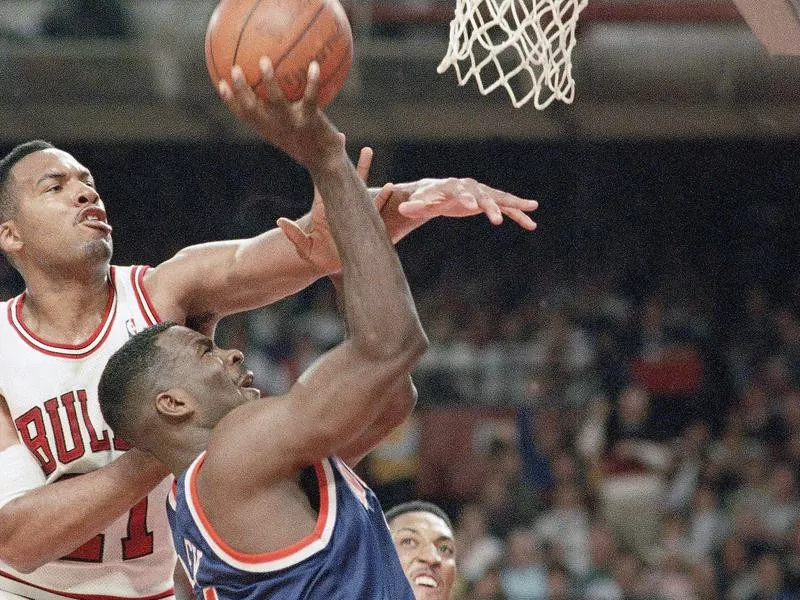
Stacey King gets physical during a playoff game against the New York Knicks in 1993. Fred Jewell / AP Photo
Years with Bulls: 1989-94 (5 seasons)
Statistics/game: 17.0 minutes/6.6 points/3.3 rebounds/1.0 assists/0.4 steals/0.5 blocked shots
Win shares/48 minutes: .087
Also played with: Minnesota Timberwolves, Miami Heat, Boston Celtics, Dallas Mavericks
NBA titles: 3 (1991 1992, 1993)
Bottom line: After a stellar Oklahoma career, Stacey King was drafted sixth overall in the 1989 draft, 11 spots ahead of Shawn Kemp.
King was part of the rotation in the first three-peat run, not as a starter but an overweight, out-of-shape reserve, which annoyed the hell out of many in the organization.
He would become far more popular locally as a team broadcaster with pet phrases such as “Too big, too strong, too fast, too good!” You know, as opposed to “Too big, too fat, too slow, too bad!”
24. Quintin Dailey, Guard
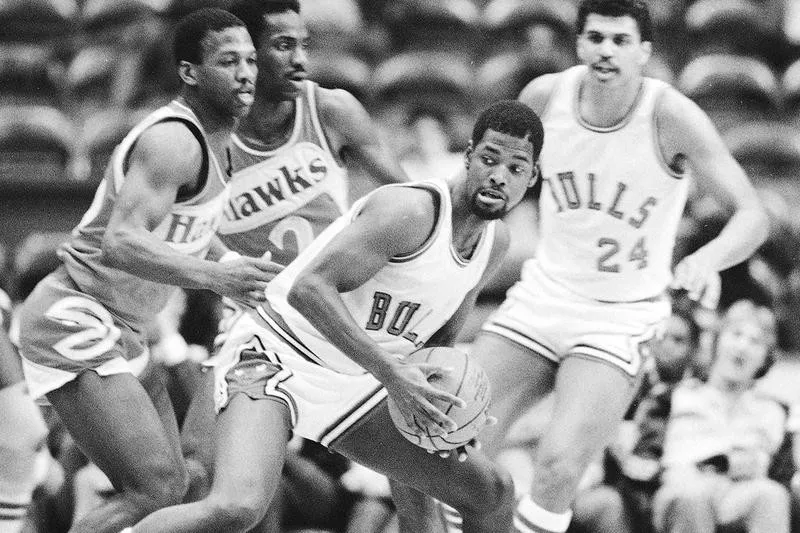
Quintin Dailey, during his rookie year in 1982, against the Atlanta Hawks. Fred Jewell / AP Photo
Years with Bulls: 1982-86 (4 seasons)
Statistics/game: 27.0 minutes/16.4 points/2.8 rebounds/2.9 assists/1.0 steals/0.1 blocked shots
Win shares/48 minutes: .061
Also played with: Los Angeles Clippers, Seattle SuperSonics
NBA titles: None
Bottom line: Despite a sexual assault conviction, the talented scorer was drafted seventh overall in the 1982 draft out of the University of San Francisco.
When Chicago Sun-Times columnist John Schulian destroyed him and the front office the next day, his Bulls career was doomed as soon as it started.
Quintin Dailey still played 272 games with the Bulls (114 after Michael Jordan was drafted in 1984) and posted respectable numbers.
23. George Gervin, Guard-Forward
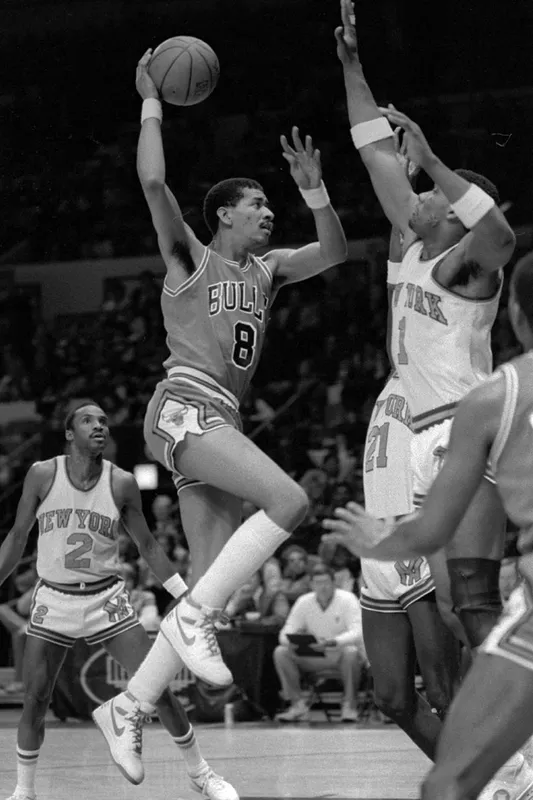
George Gervin goes to the basket against the New York Knicks in 1986. Ron Frehm / AP Photo
Years with Bulls: 1985-86 (1 season)
Statistics/game: 25.2 minutes/16.2 points/2.6 rebounds/1.8 assists/0.6 steals/0.3 blocked shots
Win shares/48 minutes: .069
Also played with: San Antonio Spurs
NBA titles: None
Bottom line: The 33-year-old “Ice Man” was acquired to ease the load on Jordan amid questions about how well the two and Quintin Dailey would co-exist in the same offense.
After His Airness went down with a foot issue only days into the regular season, however, guess who became the primary option.
The veteran started 75 games in what would be his final NBA season.
22. Kyle Macy, Guard
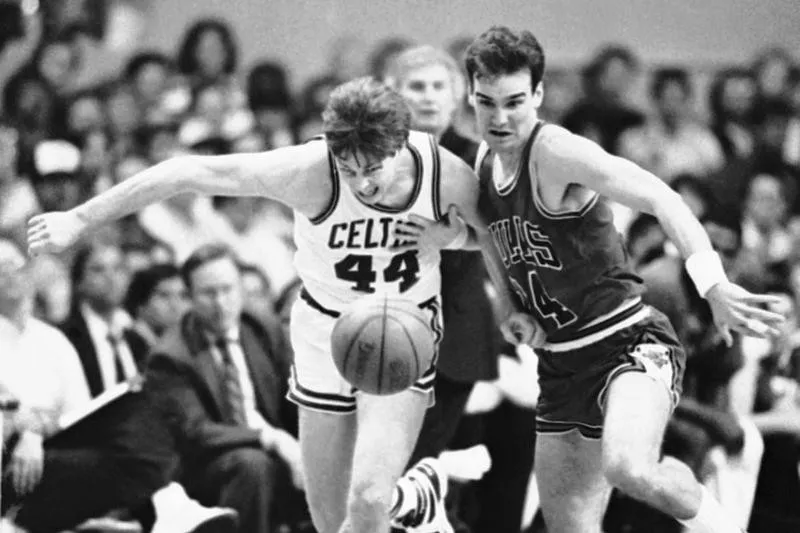
Kyle Macy fights for the ball with Boston Celtics point guard Danny Ainge in 1986. Elise Amendola / AP Photo
Years with Bulls: 1985-86 (1 season)
Statistics/game: 29.6 minutes/8.6 points/2.2 rebounds/5.4 assists/1.0 steals/0.1 blocked shots
Win shares/48 minutes: .077
Also played with: Phoenix Suns, Indiana Pacers
NBA titles: None
Bottom line: Kyle Macy’s stay with the Jordanaires couldn’t have started with more promise. Or finished with more disappointment.
In what would be a winless preseason, the front office signed the former Kentucky star to a one-year deal and handed him the keys to the offense. The team reeled off three wins to open the regular season. But Jordan went down in the last one and sat out the next four-plus months.
Macy was dealt to the Indiana Pacers after one season, left to wonder what might have been.
21. Sam Vincent, Guard
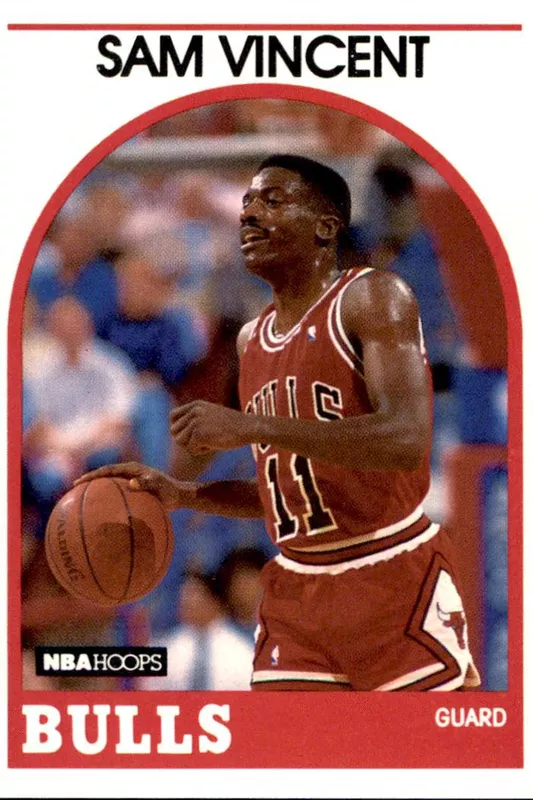
Sam Vincent played two seasons with the Bulls. Amazon
Years with Bulls: 1987-89 (2 seasons)
Statistics/game: 26.8 minutes/10.4 points/3.0 rebounds/5.8 assists/0.9 steals/0.2 blocked shots
Win shares/48 minutes: .083
Also played with: Boston Celtics, Seattle SuperSonics, Orlando Magic
NBA titles: 1 (1986)
Bottom line: Acquired before the 1988 trade deadline, the 24-year-old looked to be the answer to a chronic point guard problem. Until the playoffs.
Sam Vincent was schooled by Isaiah Thomas and the Detroit Pistons in the Eastern Conference semis, lost the starter job to John Paxson late in the next season, then was left unprotected in the expansion draft.
20. Will Perdue, Center
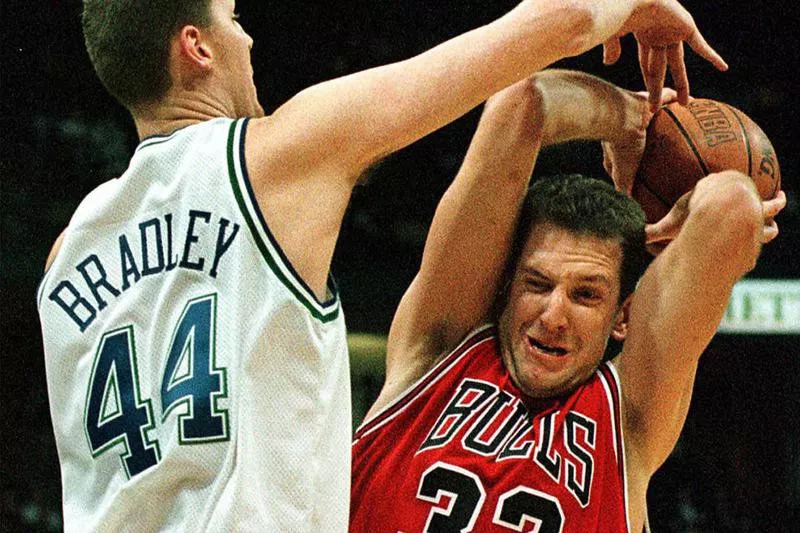
Will Perdue, right, battles against Dallas Mavericks center Shawn Bradley in 1999. Jane Hwang / AP Photo
Years with Bulls: 1988-95, 1999-2000 (8 seasons)
Statistics: 13.6 minutes/4.4 points/4.1 rebounds/0.9 assists/0.3 steals/0.6 blocked shots
Win shares/48 minutes: .083
Also played with: San Antonio Spurs, Portland Trail Blazers
NBA titles: 4 (1991, 1992, 1993, 1999)
Bottom line: Although miscast as the 11th pick of the 1982 draft — operations genius Jerry Krause bypassed Dan Majerle, Rod Strickland and Anthony Mason, among others — the 7-foot plodder was a serviceable rebounder-passer in the first title run.
Yet his greatest value was this: The career reserve was traded to the San Antonio Spurs in return for spit disturber Dennis Rodman, a mainstay in the second three-peat run.
19. Cliff Levingston, Forward
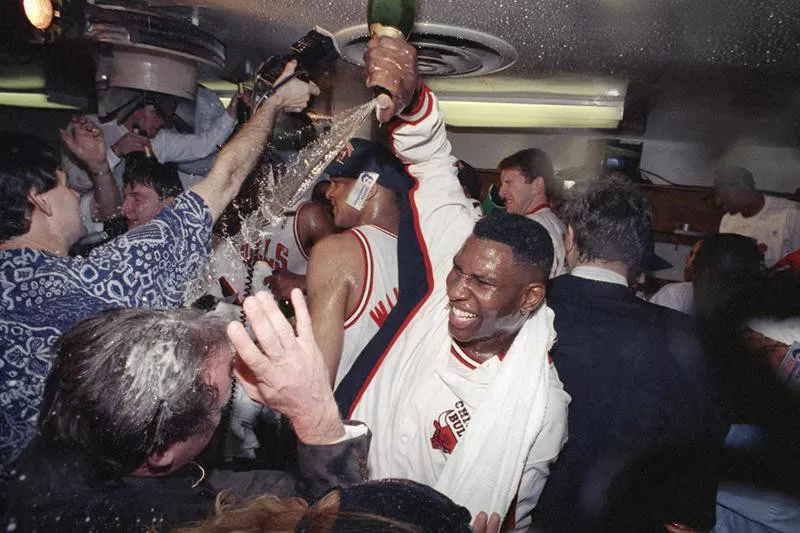
Cliff Levingston celebrates after the Bulls won their second straight NBA championship in 1992. Mark Elias / AP Photo
Years with Bulls: 1990-92 (2 seasons)
Statistics/game: 12.9 minutes/4.0 points/2.9 rebounds/0.8 assists/0.4 steals/0.6 blocked shots
Win shares/48 minutes: .117
Also played with: Detroit Pistons, Atlanta Hawks, Denver Nuggets
NBA titles: 2 (1991, 1992)
Bottom line: While in Chicago barely long enough for a cup of decaf, Cliff Levingston earned this spot on one game alone.
In the swing game of the 1991 NBA Finals, the reserve provided a huge boost with 10 points (5-of-5 in the field), four rebounds and three blocked shots in a 104-96 overtime victory over the Lakers in Los Angeles.
The Jordanaires took a 2-1 lead in the series, and their dynasty was about to be born.
18. Sedale Threatt, Guard
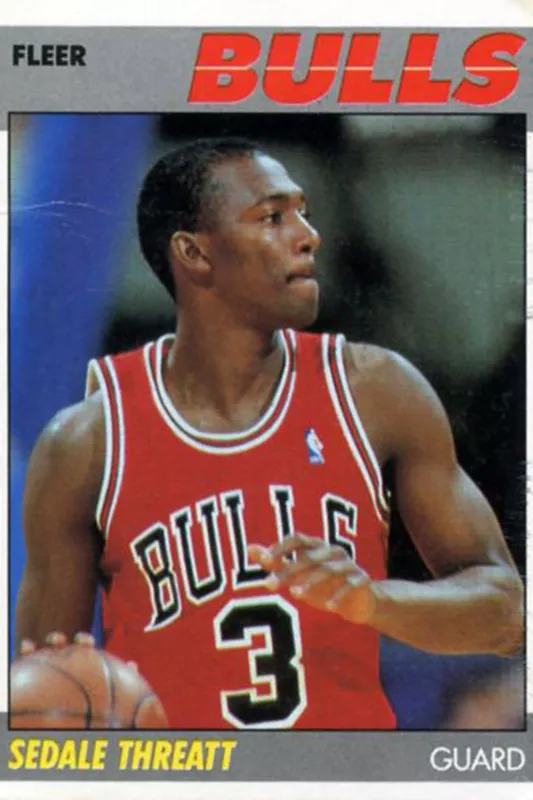
What might have been with Sedale Threatt in Chicago. Amazon
Years with Bulls: 1986-88 (2 seasons)
Statistics: 17.4 minutes/7.2 points/1.2 rebounds/3.3 assists/0.8 steals/0.1 blocked shots
Win shares/48 minutes: .112
Also played with: Philadelphia 76ers, Seattle SuperSonics, Los Angeles Lakers, Houston Rockets
NBA titles: None
Bottom line: Although the combo guard played only 85 games with the team, he might have been the best two-way backcourt player of the Jordan era other than Jordan himself.
In his search for a true point guard, general manager Jerry Krause dealt Sedale Threatt to the SuperSonics in return for Sam Vincent, who didn’t last all that long in Chicago himself.
Meanwhile, “The Thief” went on to have a successful career on the West Coast.
17. Craig Hodges, Guard
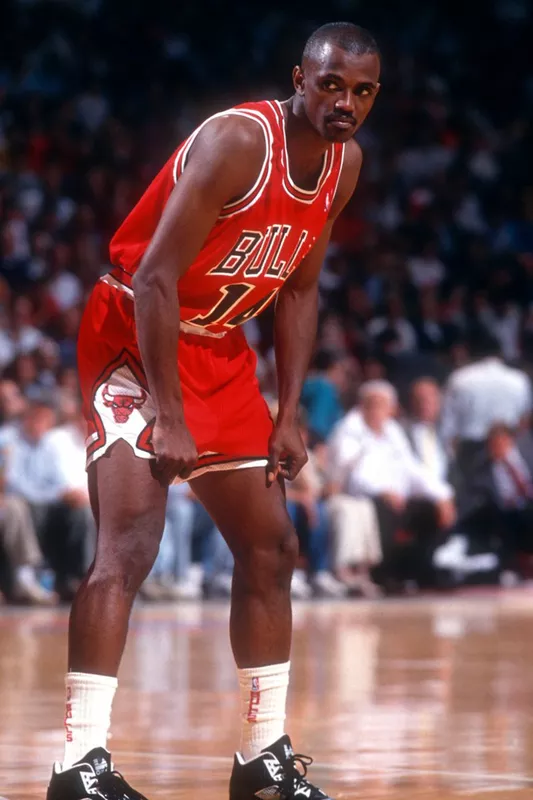
Craig Hodges always kept his eye on the ball. @SLAMonline / Twitter
Years with Bulls: 1985-88, 2001-02 (4 seasons)
Statistics/game: 14.8 minutes/6.2 points/0.8 rebounds/1.7 assists/0.5 steals/0.0 blocked shots
Win shares/48 minutes: .107
Also played with: San Diego Clippers, Milwaukee Bucks, Phoenix Suns
NBA titles: 2 (1991, 1992)
Bottom line: The three-time Long Distance Shootout champion was acquired from the Phoenix Suns for one purpose only — to hit the long ball.
In the 1988-89 and 1989-90 seasons, when he sank 45 percent of them, few ever did it better.
His Bulls highlight came against the New York Knicks in the 1991 postseason opener, in which he had 16 points and three steals in 18 minutes off the bench.
16. Gene Banks, Forward
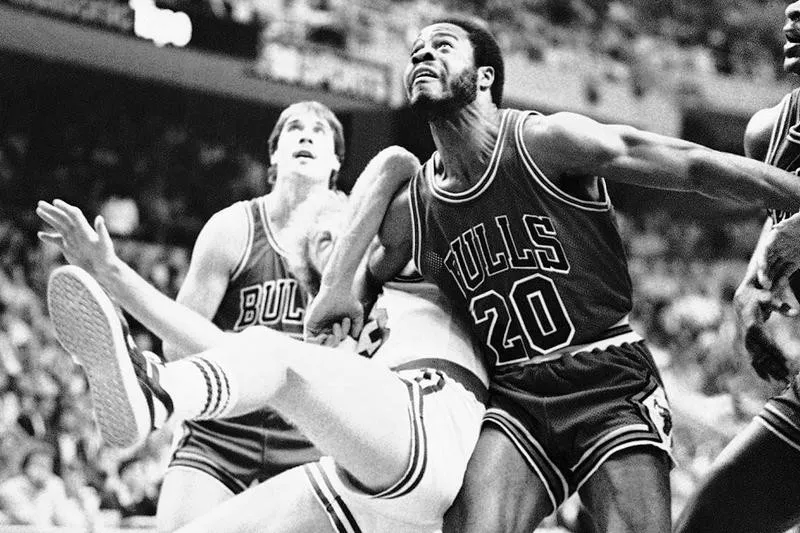
Gene Banks, right, sweeps Larry Bird off his feet during a game against the Boston Celtics in 1986. Elise Amendola / AP Photo
Years with Bulls: 1985-87 (2 seasons)
Statistics: 27.3 minutes/10.4 points/4.6 rebounds/2.9 assists/0.9 steals/0.2 blocked shots
Win shares/48 minutes: .096
Also played with: San Antonio Spurs
NBA titles: None
Bottom line: It sucked that “Tinkerbell” had to call it quits at 27 years of age, the result of a ruptured Achilles heel in a summer exhibition game.
His solid two-way game and competitive spirit would have fit in well with the championship teams of years later.
Gene Banks fun fact: A crazy cousin tagged the Dukie at a “Peter Pan” movie preview while they were in college.
15. Bill Wennington, Center
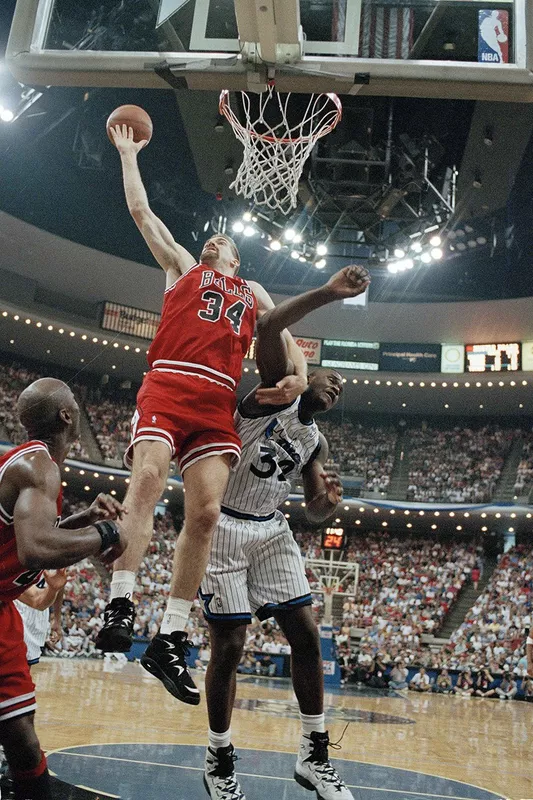
Bill Wennington battles Shaquille O’Neal for a rebound against the Orlando Magic in 1995. Chris O’Meara / AP Photo
Years with Bulls: 1993-99 (6 seasons)
Statistics/game: 13.9 minutes/5.1 points//2.7 rebounds/0.6 assists/0.3 steals/0.2 blocked shots
Win shares/48 minutes: .106
Also played with: Dallas Mavericks, Sacramento Kings
NBA titles: 2 (1996, 1998)
Bottom line: In the absence of an all-around talent, coach Phil Jackson mixed and matched his bigs with mostly good results.
“Beef” Wennington filled the void at the offensive end, where the mid-range jumper was his specialty.
He also was a willing rebounder who made up for a lack of mobility with his execution of team defense principles.
14. Orlando Woolridge, Forward
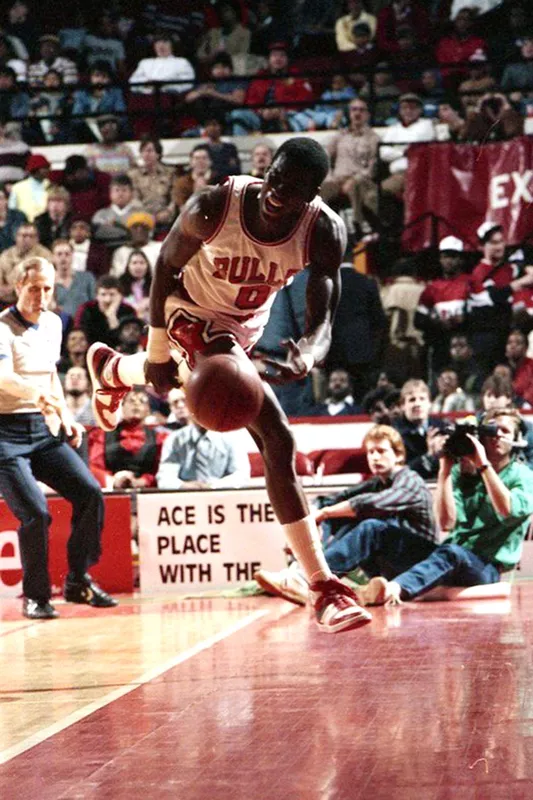
Orlando Woolridge played 354 games with the Bulls. @BullsHistory / Twitter
Years with Bulls: 1981-86 (5 seasons)
Also played with: New Jersey Nets, Los Angeles Lakers, Denver Nuggets, Detroit Pistons, Milwaukee Bucks, Philadelphia 76ers
Statistics/game: 29.4 minutes/17.4 points/4.7 rebounds/1.9 assists/0.7 steals/0.6 blocked shots
Win shares/48 minutes: .117
Also played with: New Jersey Nets, Los Angeles Lakers, Denver Nuggets, Detroit Pistons, Milwaukee Bucks, Philadelphia 76ers
NBA titles: None
Bottom line: There was little, if any, structure in Orlando Woolridge’s game, no real desire to pass, rebound and defend on a consistent basis.
But boy, could this freakish athlete smell the basket, especially in the open court, where his creative dunks would become YouTube hits.
O fun fact: He averaged 20.6 points per game the 1984-85 season, the only time that someone other than you-know-who led the team in scoring in the Jordan years.
13. Scott Williams, Forward-Center
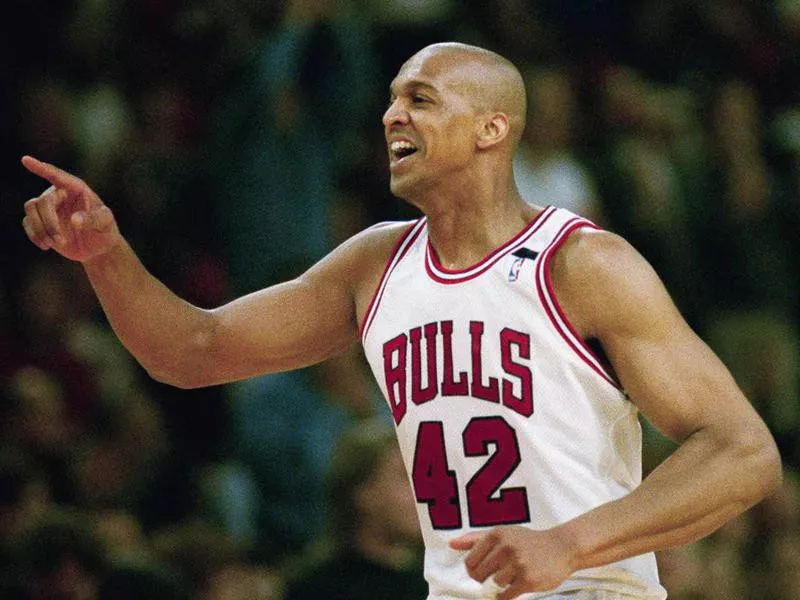
Scott Williams in 1994. John Zich / AP Photo
Years with Bulls: 1990-94 (4 seasons)
Statistics/game: 13.6 minutes/4.7 points/4.4 rebounds/0.8 assists/0.4 steals/0.6 blocked shots
Win shares/48 minutes: .138
Also played with: Philadelphia 76ers, Milwaukee Bucks, Denver Nuggets, Phoenix Suns, Dallas Mavericks, Cleveland Cavaliers
NBA titles: 3 (1991, 1992, 1993)
Bottom line: Quick, who was the most efficient rebounder-shot blocker per minutes played in the first Bulls three-peat run? You got it.
At 6-foot-10, 230 pounds, “Tank” played like his nickname — tough and physical.
Three championship rings later, the free agent took his talents to Philadelphia, where he earned almost as much in the first season ($1.5 million) as the four in Chicago combined.
12. Charles Oakley, Forward
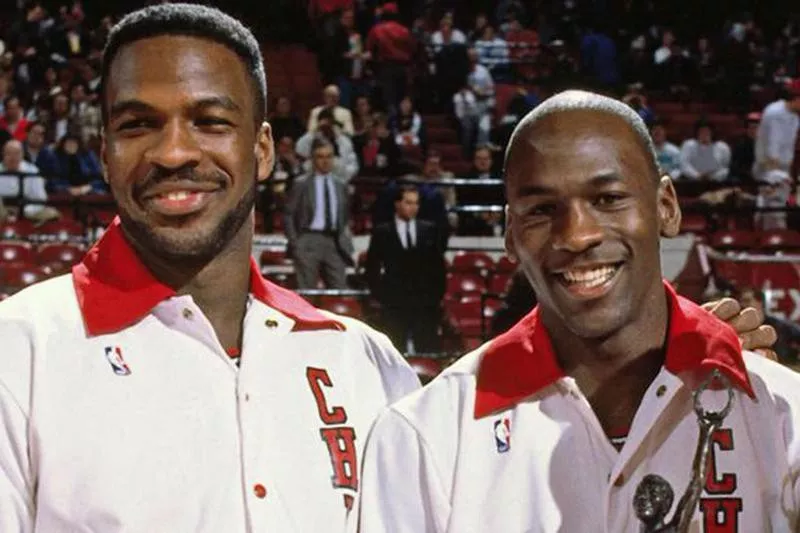
Charles Oakley started his career with the Bulls and Michael Jordan in 1985. @TheHoopCentral / Twitter
Years with Bulls: 1985-88, 2001-02 (4 seasons)
Statistics/game: 30.0 minutes/10.6 points/10.6 rebounds/2.7 assists/0.9 steals/0.4 blocked shots
Win shares/48 minutes: .070
Also played with: New York Knicks, Toronto Raptors, Washington Bullets, Houston Rockets
NBA titles: None
Bottom line: The bruiser averaged a double-double in his first three seasons in the league, but he was expendable with the younger, more athletic Horace Grant in the wings.
Charles Oakley and a first-round draft pick (Rod Strickland) were sent to the New York Knicks in return for center Bill Cartwright and a first-rounder (Will Perdue), a rare deal that really did benefit both teams.
11. Dave Corzine, Center
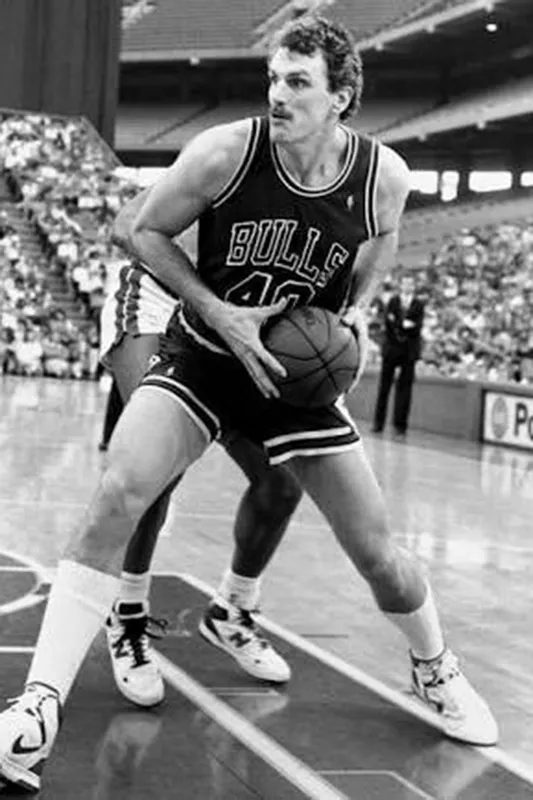
Dave Corzine played seven seasons with the Bulls. @BullsHistory / Twitter
Years with Bulls: 1982-89 (7 seasons)
Statistics/game: 27.0 minutes/9.8 points/6.3 rebounds/2.0 assists/0.5 steals/1.0 blocked shots
Win shares/48 minutes: .079
Also played with: Washington Bullets, San Antonio Spurs, Orlando Magic, Seattle SuperSonics
NBA titles: None
Bottom line: Statistically, a case could be made that the bearded big was the best player at his position in the Jordan generation. His timing couldn’t have been worse, though.
He was dealt to the Orlando Magic in exchange for a pair of second-rounders (Toni Kukoc and P.J. Brown) two years before his old team became really, really good.
10. B.J. Armstrong, Guard
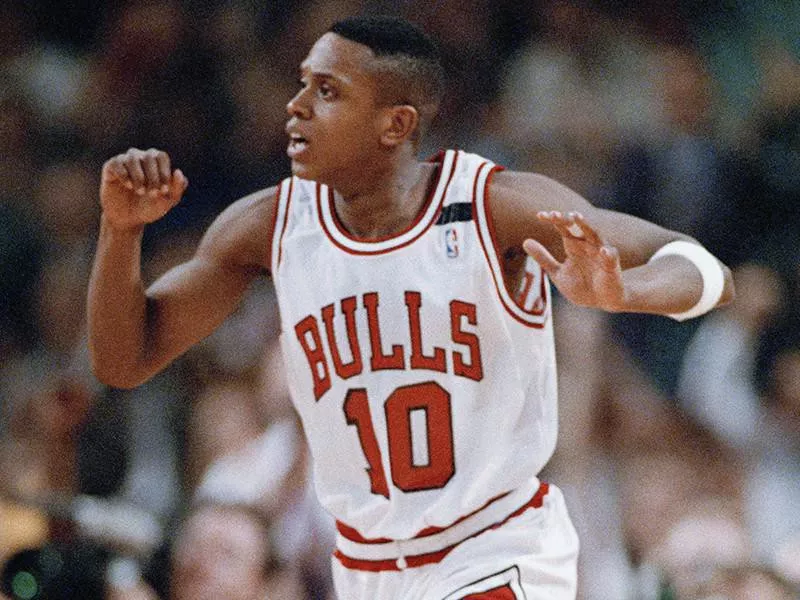
B.J. Armstrong in 1992. John Swart / AP Photo
Years with Bulls: 1989-95, 1999-2000 (7 seasons)
Statistics/game: 25.7 minutes/10.7 points/1.8 rebounds/3.4 assists/0.8 steals/0.1 blocked shots
Win shares/48 minutes: .172
Also played with: Cleveland Cavaliers, San Antonio Spurs
NBA titles: 3 (1991, 1992, 1993)
Bottom line: Just when the former first-rounder had come into his own at the offensive end, Michael Jordan left for a baseball career, ahem, during which B.J. Armstrong had his two best seasons with the team.
When His Airness returned two years later, the veteran Armstrong had a reduced role. In Steve Kerr, the front office also had a cheaper option.
Weeks later, Toronto made Armstrong the first pick in the 1995 expansion draft, where he followed Scott Williams and Horace Grant as core players who left Chicago without compensation.
9. Bill Cartwright, Center
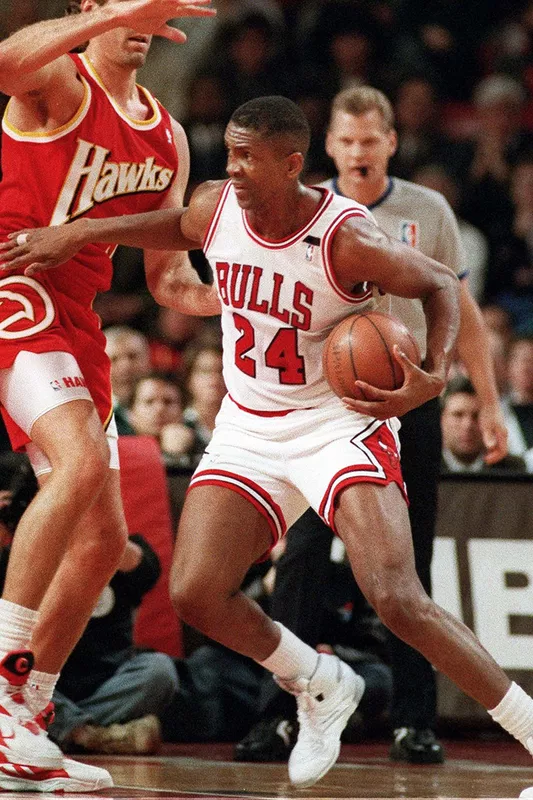
Bill Cartwright against the Atlanta Hawks in 1993. Fred Jewell / AP Photo
Years with Bulls: 1988-94 (6 seasons)
Statistics/game: 25.9 minutes/9.2 points/5.5 rebounds/1.5 assists/0.4 steals/0.3 blocked shots
Win shares/48 minutes: .074
Also played with: New York Knicks, Seattle SuperSonics
NBA titles: 3 (1991, 1992, 1993)
Bottom line: Bill Cartwright was past his prime when he arrived from New York in a trade, but the 31-year-old veteran gave his new team what it needed in the paint area — a hard edge and two sharp elbows.
Mr. Bill was worth Charles Oakley and draft pick Rod Strickland for his work against Patrick Ewing alone.
The New York Knicks’ star center beat him only once in five playoff series, and the only triumph came with His Highness in retirement.
8. Steve Kerr, Guard
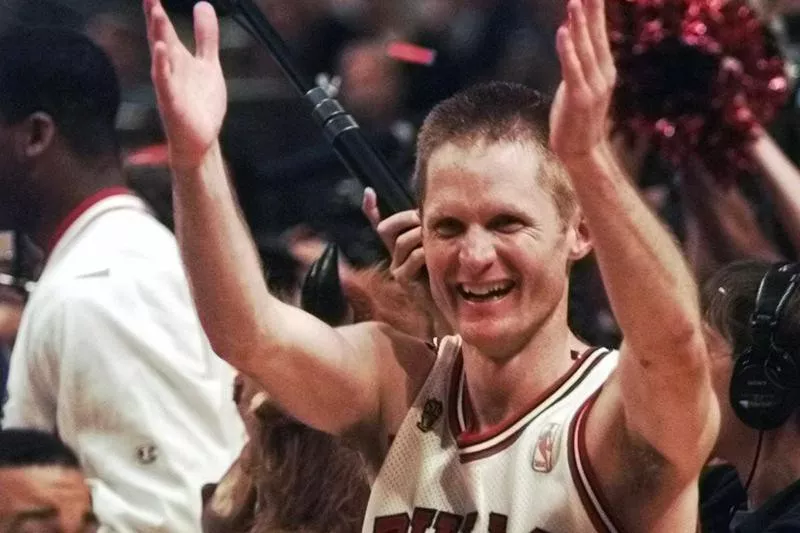
Steve Kerr celebrates after the Bulls beat the Utah Jazz to win the NBA championship in 1997. Beth A. Keiser / AP Photo
Years with Bulls: 1993-98 (5 seasons)
Statistics/game: 23.2 minutes/8.2 points/1.5 rebounds/2.2 assists/0.7 steals/0.0 blocked shots
Win shares/48 minutes: .172
Also played with: Phoenix Suns, Cleveland Cavaliers, Orlando Magic, San Antonio Spurs, Portland Trail Blazers
NBA titles: 5 (1996, 1997, 1998, 1999, 2003)
Bottom line: Along with BFF Jud Buechler, Steve Kerr (“Opie”) got it as much as any Jordan teammate. The well-traveled veteran understood that, if he showed up on time, kept his mouth shut and hit the open shot, there was a legacy to be made in Chicago.
So late in Game 6 of the 1997 title clincher, when Jordan looked at him and said, “This is your chance,” nobody was better prepared to make good of it.
Moments later, Kerr drained an open 17-footer off an MJ pass for the game-winner. God help Steve Kerr if he had bricked it.
7. Luc Longley, Center
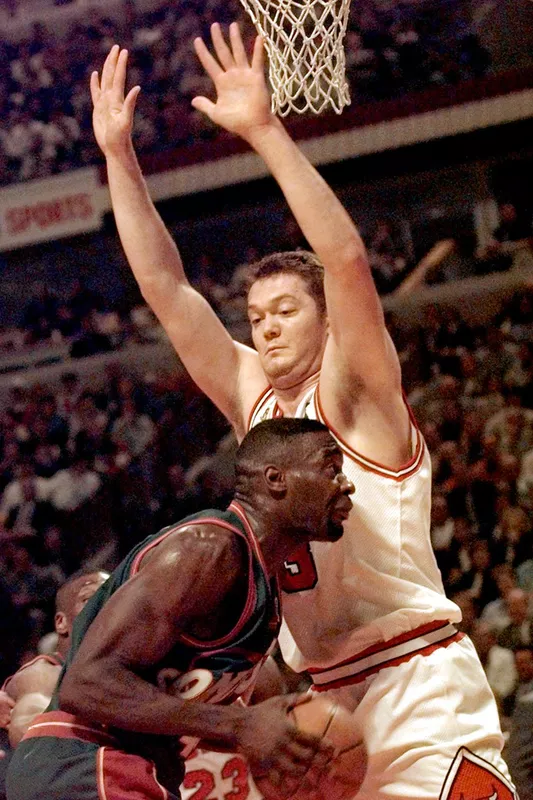
Luc Longley puts up a wall to slow down the Seattle SuperSonics’ Shawn Kemp during the 1996 NBA Finals. Fred Jewell / AP Photo
Years with Bulls: 1993-98 (5 seasons)
Statistics/game: 24.3 minutes/8.9 points/5.3 rebounds/2.1 assists/0.4 steals/1.1 blocked shots
Win shares/48 minutes: .100
Also played with: Minnesota Timberwolves, Phoenix Suns, New York Knicks
NBA titles: 3 (1996, 1997, 1998)
Bottom line: Luc Longley was the most skilled and mobile of the three-headed Clydesdale in the middle.
The 7-foot-2 big was most effective on the block but could also step out to hit an occasional jump shot. He also was the best shot-blocker of the bunch, and only Dennis Rodman was better on the glass.
The Melbourne native had a bit of a Wilt Chamberlain complex, though, which deprived him of a killer instinct.
Truth is, there were many days when Jordan would have liked to kick his Aussie.
6. John Paxson, Guard
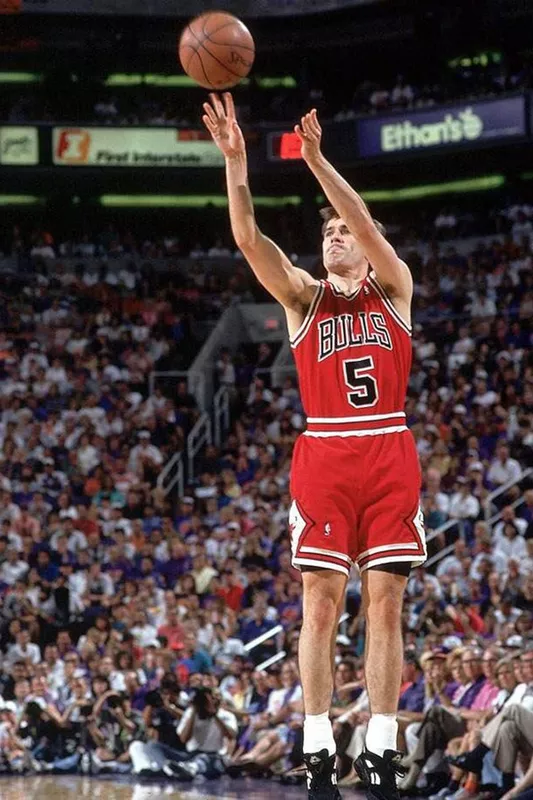
John Paxson was a lights-out shooter. @Chicago_History / Twitter
Years with Bulls: 1985-94 (9 seasons)
Statistics/game: 24.1 minutes/7.6 points/1.2 rebounds/3.7 assists/0.7 steals/0.1 blocked shots
Win shares/48 minutes: .103
Also played with: San Antonio Spurs
NBA titles: 3 (1991, 1992, 1993)
Bottom line: “Johnny Jumpshot” was a point guard in name only. The man was born to shoot the ball, and with Michael Jordan around, John Paxson made a career off open looks.
The most famous was indicative of the Jordan effect — the championship clincher against the Phoenix Suns in Game 6 of the 1993 NBA Finals came with no defender closer than Yuma.
By the way, they were the only Bulls points scored by someone other than His Airness in the fourth quarter.
5. Ron Harper, Guard
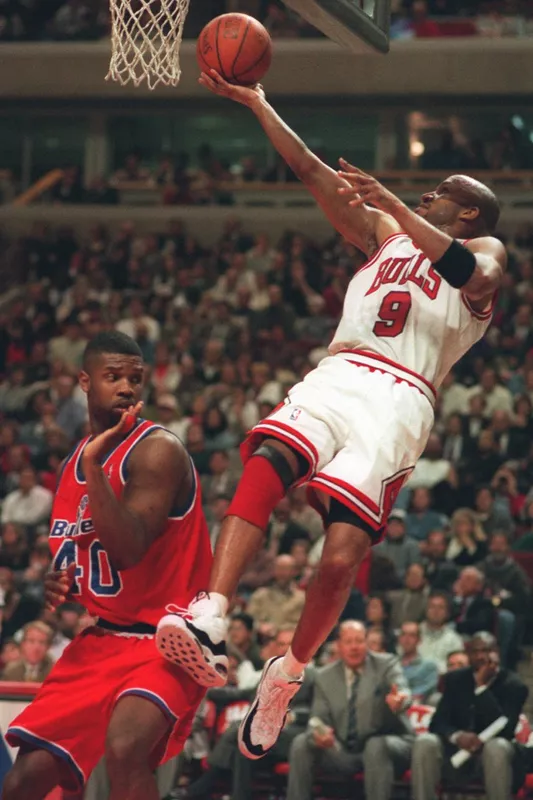
Ron Harper shoots over Washington Bullets forward Calbert Cheaney in 1996. John Zich / AP Photo
Years with Bulls: 1994-99 (5 seasons)
Statistics/game: 24.4 minutes/7.9 points/3.0 rebounds/2.6 assists/1.3 steals/0.5 blocked shots
Win shares/48 minutes: .128
Also played with: Cleveland Cavaliers, Los Angeles Clippers, Los Angeles Lakers
NBA titles: 5 (1996, 1997, 1998, 2000, 2001)
Bottom line: Michael Jordan and general manager Jerry Krause agreed on personnel about as often as it snowed in Burmuda. Here was one of those ultra-rare occasions.
When Ron Harper was rescued from the Clippers as a 31-year-old free agent, he wasn’t the same athlete who gave Jordan all that he could handle in his Cavaliers days.
But his savvy and length were valuable at the defensive end especially. And Harp was one of the few trusted teammates whom MJ allowed in his inner sanctum.
4. Dennis Rodman, Forward
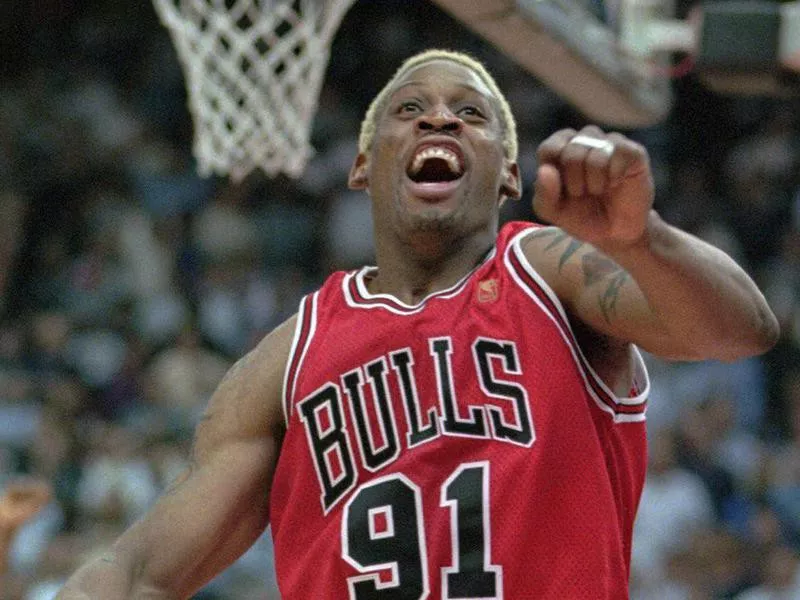
Dennis Rodman celebrates a Bulls win over the Washington Bullets to sweep their first-round NBA playoff series in 1997. Roberto Borea / AP Photo
Years with Bulls: 1995-98 (3 seasons)
Statistics/game: 34.6 minutes/5.2 points/15.3 rebounds/2.8 assists/0.6 steals/0.3 blocked shots
Win shares/48 minutes: .140
Also played with: Detroit Pistons San Antonio Spurs, Los Angeles Lakers, Dallas Mavericks
NBA titles: 5 (1989, 1990, 1996, 1997, 1998)
Bottom line: The coaches had seen enough of his Bad Boy act in Detroit to know his m.o. as well as his potential value. So here was the deal: As long as the madman hit the boards, played defense and got inside the heads of opponents and referees, the organization would turn a blind eye to odd-Bull behavior on and off the court. The Worm fun fact: In his farewell season, he had 14 games of 20-plus minutes and two-or-less field goal attempts.
3. Toni Kukoc, forward
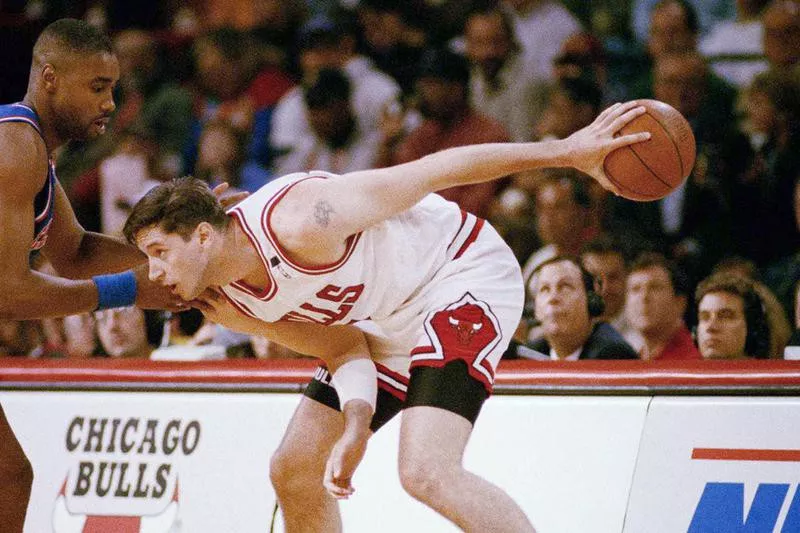
Toni Kukoc in action against the Cleveland Cavaliers in 1994. Barry Jarvinen / AP Photo
Years with Bulls: 1993-2000 (7 seasons)
Statistics/game: 29.5 minutes/14.1 points/4.8 rebounds/4.2 assists/1.1 steals/0.4 blocked shots
Win shares/48 minutes: .154
Also played with: Milwaukee Bucks
NBA titles: 3 (1996, 1997, 1998)
Bottom line: Jerry Krause put the Croatian in a bad spot when he drooled over him in the 1990 draft, two years before he arrived from overseas.
In the meantime, the GM refused to extend the grossly underpaid Scottie Pippen to pay for an untested Euro who had yet to play an NBA game. Can you spell t-r-o-u-b-l-e, girls and boys?
When the rookie finally came aboard, Jordan, Scottie Pippen and company were quick to exact their pound of flesh. Ironically, when Pippen had his infamous hissy fit late in Game 3 of the 1994 Eastern Conference semifinals, guess whose buzzer-beater saved his butt.
While the long, tall lefty wasn’t all that had been advertised, Toni Kukoc’s size, length and versatility represented a difficult matchup off the bench.
2. Horace Grant, Forward
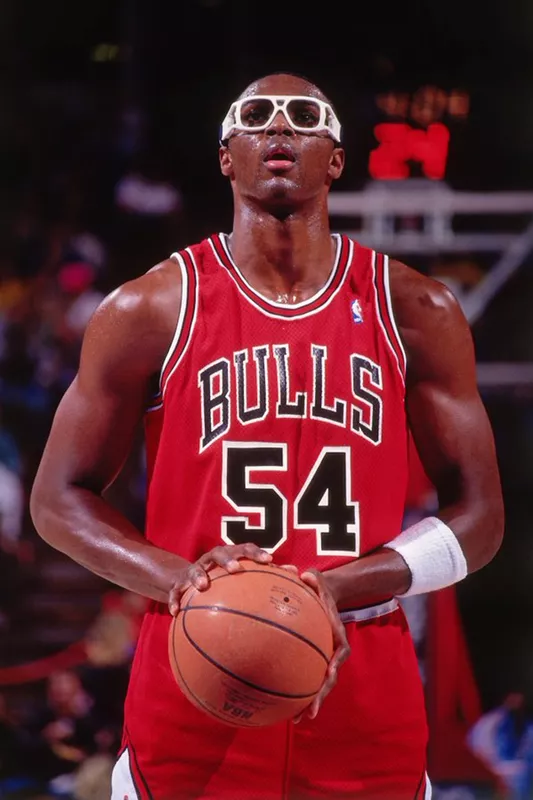
Horace Grant is one of the most underrated players in NBA history. @chicagobulls / Twitter
Years with Bulls: 1987-94 (7 seasons)
Statistics/game: 33.3 minutes/12.6 points/8.6 rebounds/2.4 assists/1.1 steals/1.1 blocked shots
Win shares/48 minutes: .164
Also played with: Orlando Magic, Seattle SuperSonics, Los Angeles Lakers
NBA titles: 4 (1991, 1992, 1993, 2001)
Bottom line: While everyone in the organization was under the radar in the Jordan years, no player did more to be appreciated less than Horace Grant.
A consistent shotmaker and double-figure scorer, the athletic 6-foot-10 big was even more valuable at the other end. He was a dependable rebounder-shot blocker who covered more ground than anyone at this position, which made him an indispensable piece of the so-called Doberman defense.
Later, he became the only Bulls player to get the best of Jordan in the playoffs after said player left the team (1995 Eastern Conference semis, Orlando Magic in six).
Another Ho fun fact: He ranks 121st in win shares per 48 minutes (.1469) in league history, six spots ahead of Scottie Pippen.
1. Scottie Pippen, Forward
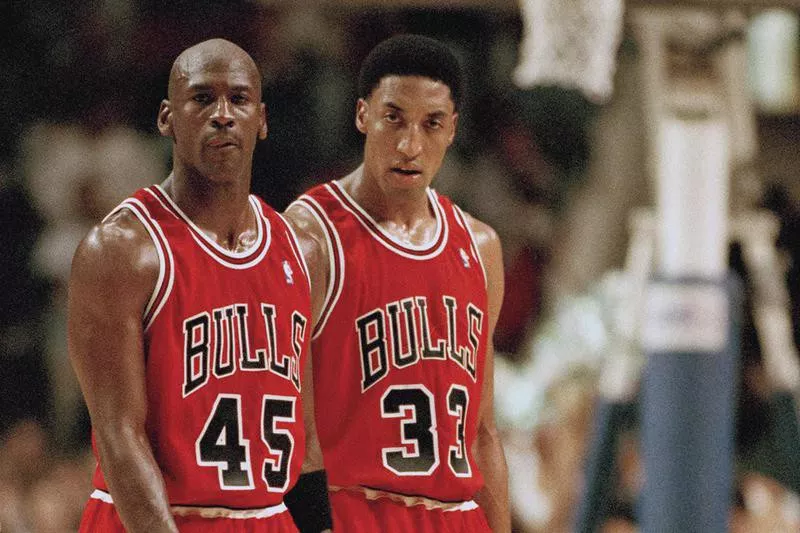
Batman and Robin in 1995. Michael Conroy / AP Photo
Years with Bulls: 1987-98, 2003-04 (12 seasons)
Statistics/game: 35.4 minutes/17.7 points/6.7 rebounds/5.3 assists/2.1 steals/0.9 blocked shots
Win shares/48 minutes: .158
Also played with: Portland Trail Blazers, Houston Rockets
NBA titles: 6 (1991, 1992, 1993, 1996, 1997, 1998)
Bottom line: The best second banana in hoops history didn’t ripen overnight.
His first two postseason appearances concluded with The Migraine (zero points, one minute) and The Meltdown (two points, 40 minutes) in the Eastern Conference finals, gag jobs that cast doubts about his testosterone level when the stakes were highest.
But when Jordan dared Scottie Pippen to toughen up the next season — OK, it was closer to a death threat, as I recall — he responded with the first of his seven All-Star selections.
It wasn’t long before Pip would re-redefine the point forward position as one of the most complete players in the game, the yin to Jordan’s yang. Pippen was the best player on the court (32 points, 13 rebounds, seven assists) in Game 6 of the 1991 NBA Finals, when the Jordan dynasty got its start.